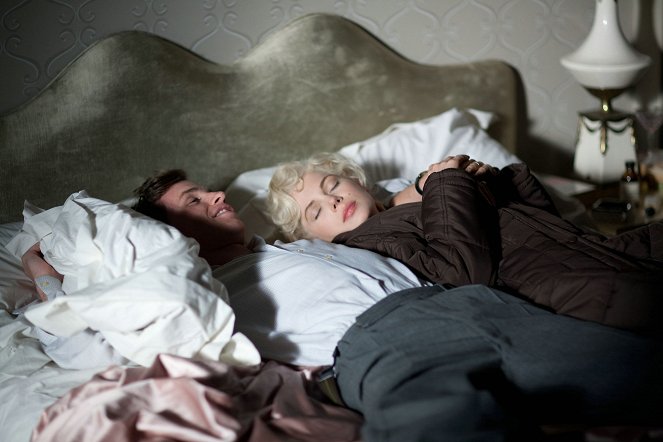Regie:
Simon CurtisDrehbuch:
Adrian HodgesKamera:
Ben SmithardMusik:
Conrad PopeBesetzung:
Michelle Williams, Eddie Redmayne, Kenneth Branagh, Judi Dench, Emma Watson, Dominic Cooper, Julia Ormond, Dougray Scott, Derek Jacobi, Zoë Wanamaker (mehr)Streaming (3)
Inhalte(1)
Es ist zwar nur die Position des dritten Regieassistenten, doch damit kann sich Hochschul-Absolvent Colin (Eddie Redmayne) zumindest einen Teil seines Traums von einer Karriere beim Film verwirklichen. Noch dazu handelt es sich um eine große Produktion, denn der berühmte Schauspieler und Regisseur Laurence Olivier (Kenneth Branagh) wird in London einen Film drehen mit Marylin Monroe (Michelle Williams). Neben Olivier soll die Filmdiva aus Hollywood die Hauptrolle spielen. Marylin Monroe kommt in Begleitung ihres Ehemanns Arthur Miller und der Schauspiel-Trainerin Paula Strasberg. Colins Aufgabe ist es, sich um den Kinostar zu kümmern, und ihr vor allem die lästige Presse vom Leib zu halten. Aber schon bald erweist sich die Zusammenarbeit zwischen dem eitlen Olivier und der Monroe als extrem schwierig. Colin gelingt es, das Vertrauen des verletzlichen Superstars zu gewinnen. Doch selbst für ihn wird es immer schwieriger, die Launen und psychischen Probleme der Monroe unter Kontrolle zu halten. (ServusTV)
(mehr)Videos (41)
Kritiken (8)
Es hat nur recht wenig gefehlt und dieser Film wäre ein gutes Drama über die zerstörerische Aureole von Sternen und Zirkus geworden, das Menschen zu Schauspielern macht, selbst in den gängigsten Situationen. Kenneth Branaghs Monologe haben es an einigen Stellen in sich, diese Kraft der noblen Tragödie der Bühne, welche dem Ganzen der William einst einflößte. Selbst Michelle Williams ist in ihrer Rolle einer Dame mit einem aufgedunsenen Rock hervorragend - in ihr steckt ein wenig sexy Kreatur, welche die Welt um sich herum hypnotisiert - selbst die labilen und widerlichen Versager, mit denen sich die tschechische Sängerin Iveta Bartošová sicherlich verstehen würde. Dieser Film möchte einerseits die Kehrseite des Showbusiness zeigen, andererseits genießt er nostalgisch und lässt sich rühren von diesem ganzen Theater. Diese beiden Tendenzen laufen gegeneinander und zerbrechen aneinander. The Artist ist es gelungen, diese doppelte Spannung vom Syndrom des Goldenen Zeitalters auf spielerische Art und Weise auszugleichen, was auch eine ironische Weitsicht beinhaltet, jedoch verdienstgekrönte klassizistische Fassade von Curtis‘ Film vermag so etwas nicht. Sie ist schwer, voll unnötigen Kitsches- sowie visueller Phrasen. An Stellen, wo der Film gut zu werden beginnt (weil er über ein verschwitztes Melodrama eines Jungen aus den breiten Massen hinausgeht, welcher die Sterne berührt), hält er sich stets einen sentimentalen Rückzugsweg frei. Somit haben wir es hier mit einer großartigen Promenade britischer Legenden, wundervoller Darbietungen und Charaktere zu tun, die so viel Pathos und theatralischen Manierismus inne haben, dass man ihr "zweites Ich" gar nicht zu Gesicht bekommt, über das sie manchmal verwirrt sprechen ... Schade.
()
Colin Clark und seine Bücher "The prince, the showgirl and me: the Colin Clark Diaries" (1995) und "My week with Marilyn" (2000) sind lediglich lokale Phänomene. Und als solche haben sie natürlich nicht einmal eine deutsche Übersetzung. Das ist klassisches britisches Parasitentum an Hollywood. Und die Filmversion dieser Geschichte ist genau die gleiche, so könnte ein Film über jeden Film gemacht werden, den ein Hollywood-Star außerhalb der USA gedreht hat (was er gegessen hat, wer sich in in verliebt hat, was der Ehepartner gesagt hat...). Und das ist ein wirklich minderwertiges Genre. Dabei spielt es absolut keine Rolle, dass die Besetzung mit Namen wie Julia Ormond, Derek Jacobi, Judi Dench und Kenneth Branagh hervorragend ist. Eventuell die beliebten jungen Schauspieler Eddie Redmayne, Emma Watson und Michelle Williams (deren Interpretation der Monroe gelinde gesagt fragwürdig ist). Der Film Der Prinz und die Tänzerin war das erste Projekt von Marilyn Monroe Productions, Monroe brachte also nicht nur ihren Namen, das Star-Paar Monroe-Miller, sondern auch Geld nach England, und es ist daher unrealistisch, einen Film über sie als jemanden zu drehen, der am Set geduldet wurde.
()
Whereas Colin matures over the course of the film thanks to a number of more experienced women, the film itself unfortunately missed out on this maturation process. After showing a few signs of maturity, the film ultimately returns to its initial superficiality. Furthermore, the coming-of-age storyline with the dull narrator does not obscure the fact that Colin is here only so that we can observe someone more famous through his eyes. However, this does not excuse the prevailing naïveté of that point of view. ___ The filmmakers did not go further than making an attempt to enchant only with a shiny surface. They would like to show Marilyn as a fragile and vulnerable being, but they don’t want to abandon the myth of the self-confident star. The effort to have both elements leads to failure on two fronts. The narrator admits to taking the actress’s side, which corresponds to the chosen perspective. Marilyn (like women in general) is viewed with greater understanding than the narcissistic Olivier. In presenting an idealised image, however, the film does not go far enough in humanising her, just as it refuses to be fully enchanted by classic Hollywood (like The Artist). Both of these aspects are hindered by moments of ironic self-reflection and the deliberate depiction of the star as people want to see and love her (or rather moments of double self-reflection, when Marilyn is despondent over her ugly face, which doesn’t belong to her, but to Michelle Williams). The simple enchantment and pure joy of being at the side of the star do not work because of the realistic moments of awakening, whose incorporation into the plot is inconsistent and more or less random. ___ Though probably unintentionally, the romantic storyline also brings the film closer to the remotely suspected truth. From the actress’s adherence to the “seduce and discard” method and the week mentioned in the title, it is apparent that Marilyn and Colin’s relationship will go nowhere. This is probably how a similar affair would have turned out in reality, but their moments together lack the necessary sense of detachment and are played and directed too seriously, though we – unlike the film’s creators – feel that it doesn’t make any sense to focus on them. ___ Michelle Williams deals with an issue similar to that facing the director, namely how to depict Marilyn. Though she may have got to know her more famous colleague from the other side (thanks to statements of relatives and loved ones), she has to use the same typical gestures in scenes of both intimate moments and public appearances in order for us to believe her performance. She has to be the Marilyn as we know her best, i.e. not the real Marilyn. Not to mention that in the space of one week, it’s not possible to do more than outline a rough sketch. At the same time, the believability of Williams’s performance is aided by the fact that, away from the cameras, she doesn’t try to evoke the eroticism that surrounded the real Marilyn at every step. Thanks to the suppression of that sensuality, she can focus more on the actress’s tattered psyche and thus do a better job than Marilyn herself at portraying who Marilyn actually was. Unfortunately, the screenwriter doesn’t leave enough space for a more detailed depiction of authentic situations. ___ While Williams strives for a perceptive interpretation of her character, Branagh’s caricature of Olivier merely diverts My Week with Marilyn from its mostly serious direction. There is not a noticeable resemblance between Olivier and Branagh; at best, their similarity can be seen in their shared love of Shakespeare (which was probably the reason that Branagh got the role). The film’s male characters are generally treated with likable indifference. After all, it’s about Marilyn, so why bother with what led Olivier, who stuck to the script as written, to cast an obstinate method actress, or why be concerned with the fact that Colin only gets a job instead of the girl and money thus wins out over love (only an idealist could assert that instead of love for a living person, only the more enduring love of cinema remains for him). ___ This contradictory film about a contradictory personality would have something to it if that contradictory nature weren’t merely a side-effect of a futile attempt at something like simple complexity. 60%
()
(weniger)
(mehr)
Somehow, I can’t get over Marilyn’s behavior. I must admit that people really treated each other this way back then, but all of Marilyn’s good mood stemmed from drugs and everything else hinged on that. The film stands and falls by Marilyn, who was portrayed perfectly by Michelle Williams, but to be honest, I liked watching Emma Watson more. And that’s something considering she had a very secondary role in the movie. Even so, I must admit that it’s a proper piece of filmmaking, properly British. It has the typical British gallantry, which is nice and pleasant, but it can easily bore you to sleep.
()
It's been a long time since I've enjoyed an acting performance as much as I have here in the case of Michelle Williams. She may lack the sexy sparkle of the real Marilyn Monroe, but she has perfectly nailed her gestures, poses and acting mannerisms, and the many film awards she has won for it are well deserved.
()



Werbung